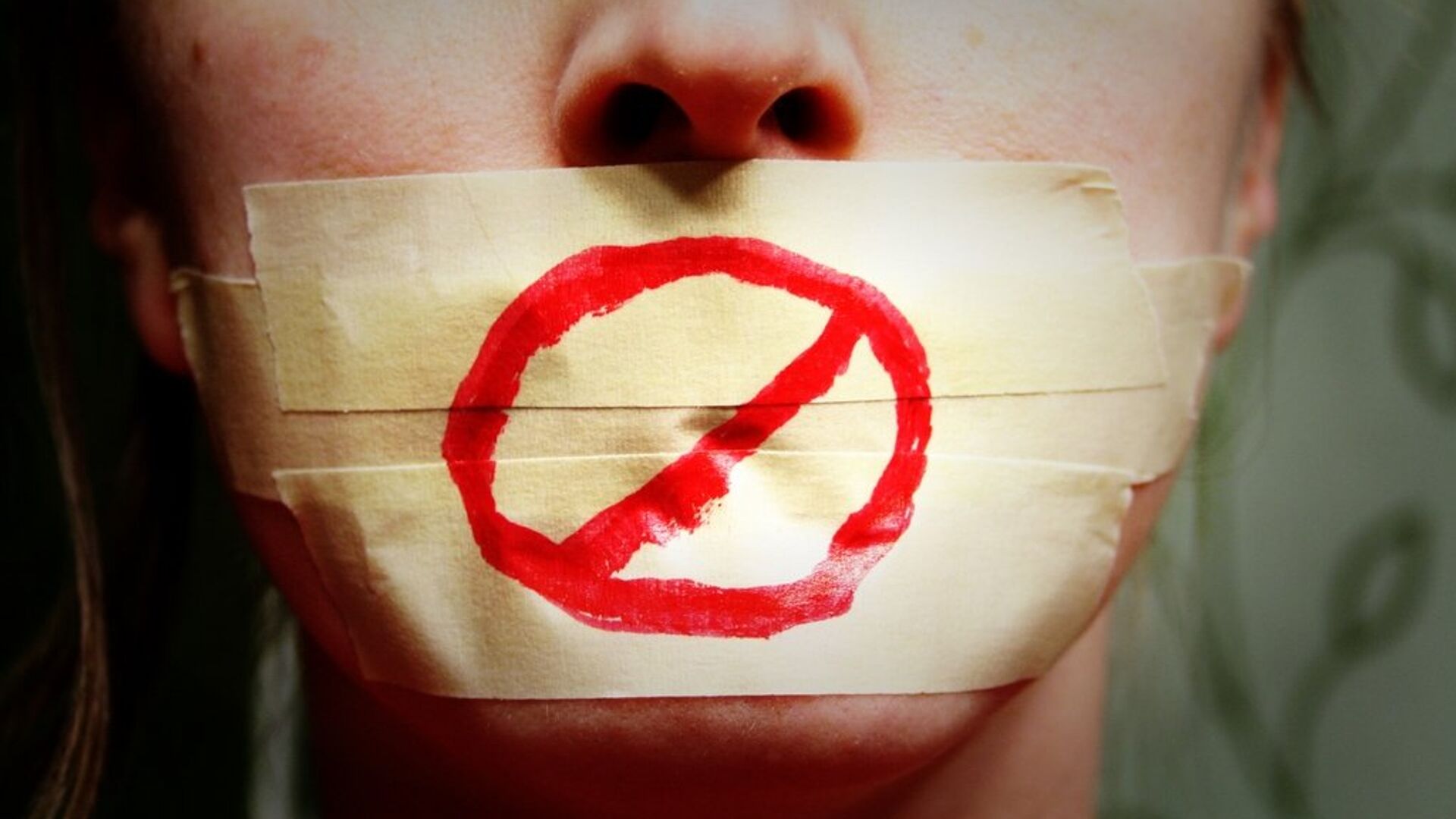https://sputnikglobe.com/20220318/first-amendment-crisis-nyt-editorial-board-on-the-hunt-for-threats-to-free-speech-1093992295.html
First Amendment Crisis? NYT Editorial Board on the Hunt for 'Threats' to Free Speech
First Amendment Crisis? NYT Editorial Board on the Hunt for 'Threats' to Free Speech
Sputnik International
The phenomenon of so-called "cancel culture" has troubled both sides of American society; a recent poll conducted by The New York Times showing that 46 percent... 18.03.2022, Sputnik International
2022-03-18T18:25+0000
2022-03-18T18:25+0000
2022-10-19T21:05+0000
us
free speech
the new york times
https://cdn1.img.sputnikglobe.com/img/104783/49/1047834955_0:37:1024:613_1920x0_80_0_0_904bbd14d78a09565e0038e1c16442f8.jpg
The United States is facing a "free speech problem", according to an op-ed published by the New York Times on Friday. The paper's editorial board has volunteered to identify the main "threats" to free speech and offer possible solutions.In a poll conducted by the NYT and Siena College Research Institute, it was found that more than half of all Americans have become more likely to hold their tongue because they were concerned about retaliation or harsh criticism. According to the findings, Republicans (58 percent) were slightly more likely to refrain from speaking out than Democrats (52 percent) or independents (56 percent).One of the threats has already been outlined in the op-ed, with the editorial board breaking down the phenomenon of "cancel culture". The NYT opinion editors took a dig at both the political left and right when talking about it, pointing out at how the left refuse to acknowledge the existence of cancel culture at all, and blaming the right for embracing "an even more extreme version of censoriousness as a bulwark against a rapidly changing society, with laws that would ban books, stifle teachers and discourage open discussion in classrooms."Critics from both left and right blasted the editorial board for the article, claiming the right to freedom of speech has never actually involved the right "not to be shamed and shunned for what's said". "The first amendment of the US Constitution has never, and was never intended to, shield us from criticism and scrutiny from other citizens," one of the users tweeted, commenting on the op-ed."The First Amendment right to force other people to endure my terrible opinions," journalist Aaron Rupar joked.Some of the critics recalled the recent American history to illustrate their point."The idea that unpopular speech should have no consequence is naive. Almost 20 years ago, a relative few of us vocally opposed the war in Iraq, and for that we were shamed and shunned," wrote the Georgia Recorder columnist Jay Bookman. "History is a never-ending renegotiation of where the lines should be drawn. But the lines themselves will always exist. We actually need them."
Sputnik International
feedback@sputniknews.com
+74956456601
MIA „Rosiya Segodnya“
2022
News
en_EN
Sputnik International
feedback@sputniknews.com
+74956456601
MIA „Rosiya Segodnya“
Sputnik International
feedback@sputniknews.com
+74956456601
MIA „Rosiya Segodnya“
us, free speech, the new york times
us, free speech, the new york times
First Amendment Crisis? NYT Editorial Board on the Hunt for 'Threats' to Free Speech
18:25 GMT 18.03.2022 (Updated: 21:05 GMT 19.10.2022) The phenomenon of so-called "cancel culture" has troubled both sides of American society; a recent poll conducted by The New York Times showing that 46 percent of Americans now feel less free when it comes to political expression.
The United States is facing a "free speech problem", according to an
op-ed published by the New York Times on Friday. The paper's editorial board has volunteered to identify the main "threats" to free speech and offer possible solutions.
"For all the tolerance and enlightenment that modern society claims, Americans are losing hold of a fundamental right as citizens of a free country: the right to speak their minds and voice their opinions in public without fear of being shamed or shunned," the op-ed read.
In a
poll conducted by the NYT and Siena College Research Institute, it was found that more than half of all Americans have become more likely to hold their tongue because they were concerned about retaliation or harsh criticism. According to the findings, Republicans (58 percent) were slightly more likely to refrain from speaking out than Democrats (52 percent) or independents (56 percent).
"This editorial board plans to identify a wide range of threats to freedom of speech in the coming months and to offer possible solutions," The Times' editorial board said. "We believe it isn’t enough for Americans to just believe in the rights of others to speak freely; they should also find ways to actively support and protect those rights."
One of the threats has already been outlined in the op-ed, with the editorial board breaking down the phenomenon of "cancel culture". The NYT opinion editors took a dig at both the political left and right when talking about it, pointing out at how the left refuse to acknowledge the existence of cancel culture at all, and blaming the right for embracing "an even more extreme version of censoriousness as a bulwark against a rapidly changing society, with laws that would ban books, stifle teachers and discourage open discussion in classrooms."
Critics from both left and right blasted the editorial board for the article, claiming the right to freedom of speech has never actually involved the right "not to be shamed and shunned for what's said".
"The first amendment of the US Constitution has never, and was never intended to, shield us from criticism and scrutiny from other citizens," one of the users
tweeted, commenting on the op-ed.
"The First Amendment right to force other people to endure my terrible opinions," journalist Aaron Rupar
joked.
Some of the critics recalled the recent American history to illustrate their point.
"The idea that unpopular speech should have no consequence is naive. Almost 20 years ago, a relative few of us vocally opposed the war in Iraq, and for that we were shamed and shunned,"
wrote the Georgia Recorder columnist Jay Bookman. "History is a never-ending renegotiation of where the lines should be drawn. But the lines themselves will always exist. We actually need them."



